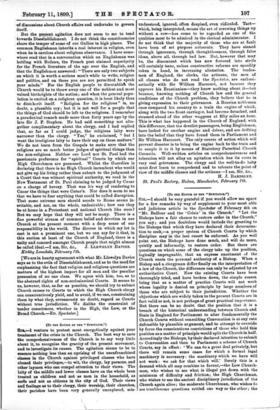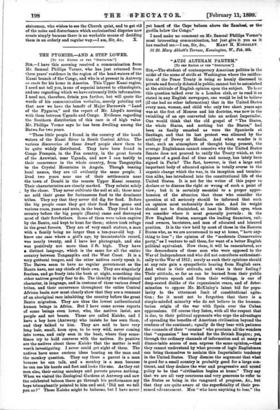[To THE Eprros or THR " Brsouroz."] SIE,—I should be
very grateful if you would allow me space for a few remarks by way of supplement to your most able and judicious article in the Spectator of February 4th on "Mr. Balfour- and the ' Crisis' in the Church." "Let the Bishops have a fair chance to restore order in the Church," you say; and you doubtless would include the granting to the Bishops that which they have declared their determina- tion to seek,—a proper system of Church Courts by which discipline may in the last resort be enforced. As you well point out, the Bishops have done much, and will do more, quietly and informally, to restore order. But there are questions on which some of the clergy take np the position, logically impregnable, that an express enactment of the Church oasts the personal authority of a Bishop. When a Bishop and a clergyman differ finally on the interpretation of a law of the Church, the difference can only be adjusted by an authoritative Court. Now the existing Courts have been thoroughly tried, and have broken down, the simple reason being that as a matter of practice Courts will not work whose legality is denied on principle by large numbers of those who are subject to their jurisdiction. Whether the objections which are widely taken to the present Courts are in fact valid or not, is not perhaps of great practical importance. But there can be no doubt that the position that it is a breach of the historical understanding between Church and State in England for Parliament to alter fundamentally the Church Courts without consulting Convocation is at any rate defensible by plausible argument, and to attempt to override by force the conscientious convictions of those who hold this position as a matter of principle would split the Church in half. Accordingly the Bishops, by their declared intention to submit to Convocation and then to Parliament a scheme of Church Courts, say in effect : We can do a great deal privately, but there will remain some cases for which a formal legal machinery is necessary : the machinery which we have will not work : we ask for that which will.' Surely this is a demand which all may combine to favour,—the Low Church- man, who wishes to see what is illegal put down with the minimum of difficulty and friction; the High. Churchman, who wishes to see the ancient disciplinary jurisdiction of the Church again alive; the moderate Churchman, who wishes to see troublesome questions settled one way or the other ; the
statesman, who wishes to see the Church quiet, and to get rid of the noise and disturbance which ecclesiastical disputes now create simply because there is no workable means of deciding them in an orderly and regular way.—I am, Sir, &c., X.







































 Previous page
Previous page